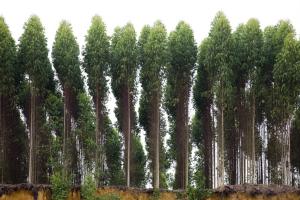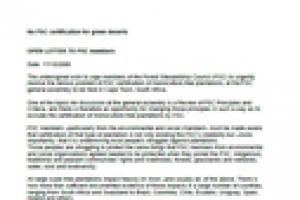The International Union of Forest Research Organizations (IUFRO) conference “Forest Plantations Meeting: Sustainable Forest Management with Fast Growing Plantations” 10-13 October, 2006 encountered heavy opposition by several environmental and ecological justice groups.
Large-Scale Tree Plantations
Industrial tree plantations are large-scale, intensively managed, even-aged monocultures, involving vast areas of fertile land under the control of plantation companies. Management of plantations involves the use of huge amounts of water as well as agrochemicals—which harm humans, and plants and animals in the plantations and surrounding areas.
Other information
30 October 2006
Bulletin articles
30 October 2006
Last month I wrote an article about FSC certification of “village forestry” in Laos. The article was based on a leaked report from a World Bank and Finnish government project, the Sustainable Forestry and Rural Development Project (SUFORD). The SUFORD report documented serious problems with logging under the project, of which 39,000 hectares has been certified by SmartWood under the Forest Stewardship Council system.
Other information
26 October 2006
Only available in Spanish -
Por Silvia Ribeiro *
Other information
13 October 2006
By Benjamin D. Hodgdon -
Bulletin articles
30 September 2006
In 2004, the Brazilian Network campaigning against the spread of tree plantations came up with the idea of instituting an International Day Against Monoculture Tree Plantations on 21 September, which is National Tree Day in that country. The idea was supported by organizations from all over the world, who since then carry out a number of special activities on this day.
It is important to stress that this is certainly not a day aimed at opposing tree planting in general, but an activity focusing on one type of plantation in particular: large scale tree monocultures.
Bulletin articles
30 September 2006
The PEFC was set up between 1998 and 1999 by the national forestry interest groups – mainly associations of small-forest owners in several European countries as the Pan European Forest Certification Scheme. It changed to its current name after having endorsed other non-European schemes. The scheme is governed by the PEFC Council, which consists of representatives of national certification schemes and are the PEFC’s members. The PEFC is not a single certification scheme with a single standard, but a programme for the endorsement of national certification schemes.
Bulletin articles
30 September 2006
At its last Conference of the Parties (COP8), the Convention on Biological Diversity adopted a very important Decision (VIII/19), “Recommending Parties to take a precautionary approach when addressing the issue of genetically modified trees”.
Bulletin articles
30 September 2006
In the year 2000 Chilean forestry companies announced the launching of their own forestry certification scheme, CERTFOR. This label was created under the auspices of the Fundación Chile, the Forestry Institute (Instituto Forestal - Infor) with the financial support of the Corporation for the Promotion of Production - CORFO (Corporación de Fomento de la Producción). After having attempted to join FSC – seeking international legitimacy – and following a negative answer, CERTFOR approached another international certification system: PEFC.
Other information
30 September 2006
Establishment of monocultures of fast-growing trees to produce so-called fast-wood has accelerated in Cambodia following the country’s transition to a market-oriented economy in the early 1990s. Proposed and established plantations under the development paradigm of ‘economic concessions’ include fast-woods acacia, pine and eucalyptus. The majority of these economic concessions violates Cambodian law and there is little evidence that they create the proposed benefits and income for the state.
Other information
30 September 2006
The study by the United Nations Food and Agriculture Organization (FAO) “Preliminary Review of Biotechnology in Forestry Including Genetic Modification” (ftp://ftp.fao.org/docrep/fao/008/ae574e/ae574e00.pdf), released in December 2004, summarized the state of biotechnology in forestry generally with a specific look at genetic modification of trees. In their findings they report 225 outdoor field trials of GM trees worldwide in 16 countries. Unfortunately they do not differentiate which field trials are current and which occurred in the past, painting a somewhat skewed picture.
Other information
30 September 2006
Wherever industrial tree plantations are planted in the South, governments provide a range of subsidies to investors. In Indonesia, the government has handed out billions of dollars for plantation development. The plantation and pulp sectors have also received generous aid support. The World Bank and the Asian Development Bank funded studies in the 1980s. A range of export credit agencies helped finance the construction of pulp mills.
Other information
30 September 2006
The history of the plantation industry in South Africa can be compared with the development of plantations elsewhere in the South: in Brazil, Aracruz Cellulose was developed under a military dictatorship; Indonesia’s pulp boom was planned and put into operation during the Suharto regime; Cambodia, Thailand and Chile provide other examples of how state oppression has benefitted pulp/plantations companies.


